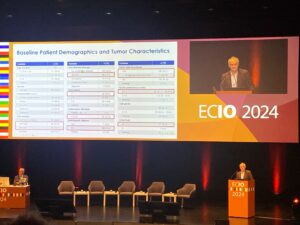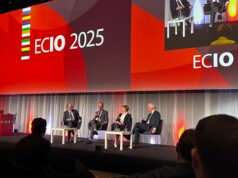
Etienne Garin (Centre Eugene Marquis, Rennes, France), presenting results from an ad-hoc interim analysis of the PROACTIF trial data, reported that “appropriately selected” patients who received transarterial radioembolization (TARE) with yttrium-90 (Y90) glass microspheres within a “personalised treatment plan” for primary and metastatic liver tumours—including intrahepatic cholangiocarcinoma (ICC)—achieved “long survival” and had a “low adverse event rate”.
Sharing these findings at the European Conference of Interventional Oncology (ECIO) annual meeting (28 April–1 May 2024, Palma de Mallorca, Spain) during the Best of ECIO session, Garin detailed the aims of the PROACTIF (Prospective post-approval multi-centre, open-label, non-interventional registry study to evaluate effectiveness of TheraSphere [Boston Scientific] in clinical practice in France) registry—the “largest Y90 registry in liver cancer” to date, he stated. Selecting ICC patients only, amounting to 168 of the 1,088 patients included in the registry, Garin and his team obtained real-world effectiveness, quality-of-life and safety data using TheraSphere Y90 microspheres, primarily measuring overall survival. Secondary endpoints were defined as adverse events and serious adverse reactions.
Garin then gave an overview of key characteristics of their patient cohort. He highlighted that: 52.4% of patients identified in this subgroup were female; median age was 69 years; 57.1% were marked as 0 using the Eastern Cooperative Oncology Group (ECOG) performance status scale; 31.5% had associated liver fibrosis/cirrhosis; and mean index lesion length was 70.7mm. Prior to Y90 treatment, 48.8% were treatment naïve and 37.5% had previous treatment (systemic, n=56; locoregional, n=6; liver surgery, n=10). Personalised treatments comprised of multicompartment dosimetry (63.1%); ultra-selective or selective treatment (53.6%); and repeat treatments—two (23.2%) or three (1.2%).
At a median follow-up of 18.2 months, Garin stated that median overall survival was 18.1 months, which he commented is an “interesting result in this cohort of non-resectable ICC patients”. Adverse events were experienced by 14 patients, and 13 patients had serious adverse reactions—10 device- or procedure-related and four hepatobiliary-related.
“This ad-hoc analysis demonstrates that TARE—when used in personalised treatment, including multicompartment dosimetry and repeat treatments, results in a favourable risk-benefit profile with long survival and low adverse event rates,” Garin said. Closing his talk, Garin added that the final results for the PROACTIF study are set to be released in 2025.











